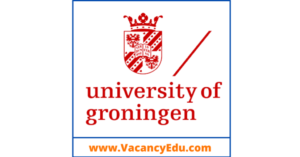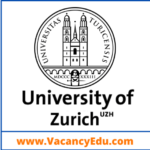University of Groningen, Netherlands invites online Application for number of Fully Funded PhD Degree at various Departments. We are providing a list of Fully Funded PhD Programs available at University of Groningen, Netherlands.
Eligible candidate may Apply as soon as possible.
(01) PhD Degree – Fully Funded
PhD position summary/title: PhD position Biomimetic Robotics: Bird-Inspired Aerial Robot Design (1.0 FTE) (V23.0432)
We seek a PhD candidate who is passionate about curiosity-driven research, designing bioinspired robots, and reading and writing broadly accessible multidisciplinary research papers about it. We are a social and dynamic research community with a fully equipped robotics research lab and makerspace for high-quality robotics research. In addition, the research team is studying the aerodynamics and biomechanics of bird flight in our animal research labs and aviaries, which will inspire your robotics research. The research instrumentation is world-class and includes a Wind Tunnel, Automated Turbulence Generation System, 3D High-Speed Videography and Surface Imaging, Automated Motion Capture, Particle Image Velocimetry, Anemometers, Large Volume Stereo Fluoroscopy (XROMM), 6-axes Load cells among other instruments and setups. Our robotics maker space includes 3D printers, a laser cutter and machining equipment complemented with robot flight testing resources and strong university machine shop support.
Deadline : 2 August 2023
(02) PhD Degree – Fully Funded
PhD position summary/title: PhD position on Building a Synthetic Cell & Membrane Biology (V23.0420)
One of the grand challenges in synthetic biology is the construction of selectively open molecular systems integrated into cell-like containers with control of solute fluxes and a constant supply of energy to fuel ATP-requiring processes. Such systems should enable long-term metabolic energy conservation and physicochemical homeostasis and a better understanding of how living cells perform these tasks. We have a vacancy for a 4-year PhD position in this area of synthetic biology. We are looking for a committed researcher with a background in biomolecular sciences. The project involves the bottom-up design and construction of minimal cell-like systems from molecular building blocks. The aim is to equip vesicles with transport proteins that are capable of accumulating building blocks for membrane expansion and protein synthesis. The research project involves complex membrane reconstitutions and protein encapsulations in synthetic vesicles, and analysis of metabolic network activities by a variety of analytical and biophysical techniques such as LC-MS, fluorescence microscopy and spectroscopy, and ligand binding and transport assays.
Deadline : 17 July 2023
View All Fully Funded PhD Positions Click Here
(03) PhD Degree – Fully Funded
PhD position summary/title: PhD position Contagious cooperation (1.0 FTE) (V23.0421)
We are looking for a highly motivated candidate for a PhD project titled “Contagious cooperation: A closer look at collective self-organization”. This aim of this position is to examine evidence for spontaneous prosocial/cooperative behaviour under conditions of acute and chronic adversity (threats). For a detailed project description, see: https://www.scoop-program.org/(…)b24iXQ==&Itemid=1015 The project is part of the transdisciplinary and interdisciplinary research programme SCOOP: Roadmaps to Resilient Societies (see: http://www.scoop-program.org). SCOOP is a research and training centre dedicated to the interdisciplinary study of sustainable cooperation as a key feature of resilient societies. SCOOP brings together researchers of the University of Groningen, Utrecht University, VU Amsterdam, Erasmus University Rotterdam, and Radboud University Nijmegen. The PhD student will participate in the SCOOP PhD training program, see: https://www.scoop-program.org/training-center-scoop
Deadline : 5 July 2023
(04) PhD Degree – Fully Funded
PhD position summary/title: PhDs: Bio-inspired Micro/Nano Electro Mechanical Systems (MEMS/NEMS) Sensors (2.0 FTE) (V23.0272)
We are currently looking to fill two fully funded PhD positions as a part of the European Union funded European research Council (ERC) Starting Grant project “Investigation of biological seal whiskers to create artificial whisker sensors for underwater robots (SEALSENSE)” (https://www.rug.nl/(…)y-kottapalli?lang=en) awarded to Dr Ajay G.P. Kottapalli (https://www.rug.nl/(…).kottapalli/research). The aim of the project is to develop bio-inspired micro/nano electromechanical systems MEMS/NEMS flow and strain sensors that are inspired from the morphology and functionality of seal whiskers. Seals possess densely innervated vibrissae (whiskers) with a unique undulating shape on their snouts (muzzles), which serve as ultrasensitive flow sensors. This overall project aims to develop seal whisker inspired MEMS flow sensors and wearable strain sensors which will be tested in experimental flow conditions that simulate the seal’s environment to shed light on the mechanisms employed by the seal in achieving an unprecedented pinpoint tracking of fish wakes. The PhDs will work in close collaboration with the Seal Sanctuary in Pieterburen (https://www.zeehondencentrum.nl/), which is located a stone’s throw away from the Zernike campus of the University of Groningen.
Deadline : 3 July 2023
(05) PhD Degree – Fully Funded
PhD position summary/title: PhD position on animal personality as a driver of reproductive isolation 1.0 FTE (V23.0309)
We are looking for a talented and enthusiastic evolutionary or behavioural ecologist for a fully funded 4-year PhD position. The successful applicant will work on a project aimed at understanding the role of animal personality in mating. The PhD candidate will work in the research group of Dr. Marion Nicolaus which is embedded within the Groningen Institute for Evolutionary Life Sciences (GELIFES), Institute of the Faculty of Science and Engineering. In most animals, individuals of the same population differ systematically in behaviour but the consequences for ecology and evolution of such ‘animal personalities’ need more attention. Because personality variation can affect how behavioural types distribute spatially and interact with each other, such phenomena could promote personality-based mating and, potentially, be a first step towards reproductive isolation and species divergence. The project will address three main questions: What is the prevalence of ‘mating by personality’ in natural populations? What are the mechanisms underlying ‘mating by personality’ (active mate choice; spatial/temporal segregation; behavioural plasticity)? What are their associated consequences for ecology and evolution? These questions will be addressed by experimental studies on three-spined sticklebacks where populations of ‘migrants’ were isolated in freshwater habitats becoming ‘residents’, following habitat fragmentation ~50 years ago. These populations of residents and migrants differ genetically in movement and social behaviours. Because conservation efforts are underway to reconnect the waterways, we need to study the consequences of barrier removal for these populations. The PhD candidate will have the possibility to do field work and design experiments in the lab and in a mesocosm system where behaviours of tagged individuals can be automatically tracked.
Deadline : 1 July 2023
Polite Follow-Up Email to Professor : When and How You should Write
Click here to know “How to write a Postdoc Job Application or Email”
(06) PhD Degree – Fully Funded
PhD position summary/title: PhD Institutions and comparative long-term development of pre-1914 Europe (V23.0402)
Today’s richest societies possess both sophisticated market economies and well-developed institutional structures. Why some countries are rich and others are poor lies at the heart of economic history. A prominent literature argues that the development of institutional structures play a prominent role in explaining patterns of development. What determines why some regimes are better able to build up their institutional capacity and promote economic growth and development, than others? Historical experiences of early European states can be used to identify the long-term relationship between economic development and (political) institutions. The Economic History group at the Faculty of Economics and Business is an international research team which studies these and associated issues to inform the debates in history, economics, and related disciplines. We specialise in the quantitative empirical investigation of long-term trends (for example, within the Groningen Growth and Development Centre GGDC and the Maddison Project).
Deadline : 30 June 2023
(07) PhD Degree – Fully Funded
PhD position summary/title: PhD Letting go of tradition? The economic implications of changing societies (V23.0405)
Western societies faced major socio-economic changes over the past centuries. Countries, firms, and individuals have become increasingly interconnected in today’s globalised world, but the benefits of globalisation have been unevenly spread. Simultaneously, roles (e.g., with respect to family, class, gender) that traditionally held societies together are subject to change. Combining insights from political science, sociology, and economics, and using rigorous quantitative methods from economics, this project adds to a growing literature that studies the causal link between the economic and social sphere. This project aims to answer novel questions in this emerging field using (micro-economic) data and state-of-the-art econometric methods that allow for causal inference. Candidates are invited to develop their own proposal for a PhD thesis that fits with the theme of the overall project. Potential projects that candidates can propose include quantifying the impact of economic developments, such as globalisation and technological change, on social structures and identity. Or alternatively, empirically investigating the subsequent effects of these changes on political and/or socio-economic outcomes, such as (gendered) labour market outcomes, mobility, political behaviour, or trust. The successful candidate is expected to play an active role in designing the PhD project, conducting literature reviews and developing theoretical arguments, analysing data, writing scientific papers, and presenting research findings at scientific conferences and research seminars.
Deadline : 28 June 2023
(08) PhD Degree – Fully Funded
PhD position summary/title: PhD Working Women (Gender), Social Networking, and Career Advancement (V23.0404)
Supporting working women is crucial, considering their significant presence in the labor force and the unique challenges they face in career progression. This project focuses on working women’s career advancement by exploring effective networking strategies tailored for women, addressing a gap in previous research that primarily considered psychological biases and corporate policies. Adopting a social perspective, this project seeks to identify unique networking patterns for women, considering the multifaceted nature of their networking and their moral concerns compared to men. By examining this question, the project aims to support individual growth of women and contributes to the sustainable competitiveness of organizations, while also advancing the diversity and inclusion in the workplace. The PhD position is embedded in the research programme Human Resource Management & Organizational Behaviour of FEB’s Research Institute. The project will be supervised by Prof. Floor Rink (promotor), Prof. Janka Stoker (promotor), and Dr Yingjie Yuan (daily supervisor).
Deadline :27 June 2023
Click here to know “How to Write an Effective Cover Letter”
About The University of Groningen, Netherlands –Official Website
The University of Groningen is a public research university in the city of Groningen in the Netherlands. The university was founded in 1614 and is the second-oldest university in the Netherlands. In 2014, the university celebrated its 400th anniversary. Currently, RUG is placed in the top 100 universities worldwide according to three international ranking tables.
The university was ranked 65th in the world, according to Academic Ranking of World Universities (ARWU) in 2019. In April 2013, according to the results of the International Student Barometer, the University of Groningen, for the third time in a row, was voted the best university of the Netherlands.
The University of Groningen has eleven faculties, nine graduate schools, 27 research centres and institutes, and more than 175-degree programmes. The university’s alumni and faculty include Johann Bernoulli, Aletta Jacobs, four Nobel Prize winners, nine Spinoza Prize winners, one Stevin Prize winner, royalty, multiple mayors, the first president of the European Central Bank, and a secretary general of NATO.
Disclaimer: We try to ensure that the information we post on VacancyEdu.com is accurate. However, despite our best efforts, some of the content may contain errors. You can trust us, but please conduct your own checks too.
Related Posts
- PhD Degree (24)-Fully Funded at Forschungszentrum Julich, Germany

- PhD Degree (08)-Fully Funded at Vrije University Amsterdam, Netherlands

- PhD Degree (27)-Fully Funded at Nottingham Trent University (NTU), England

- PhD Degree (24)-Fully Funded at University of Oslo, Norway

- PhD Degree (04)-Fully Funded at Masaryk University, Czech Republic

- PhD Degree (29)-Fully Funded at University of Oslo, Norway

- PhD Degree (13)-Fully Funded at University of Stavanger, Norway

- 08 PhD Degree-Fully Funded at EMPA, Zurich, Switzerland

- PhD Degree (11)-Fully Funded at University of Zurich, Switzerland










